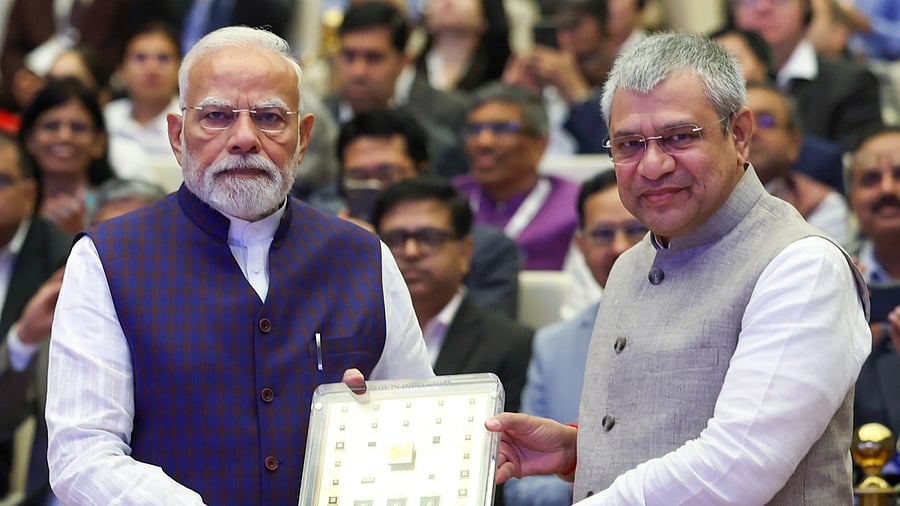
Prime Minister Narendra Modi and Union Minister Ashwini Vaishnaw unveil the first 'Made-in-India' chip, during the inauguration of 'Semicon India 2025' at Yashobhoomi, in New Delhi.
Credit: PTI
New Delhi: Prime Minister Narendra Modi on Tuesday unveiled India’s first indigenously developed microprocessor, marking a milestone in the country’s efforts to reduce dependence on imported chips, which are critically important for modern manufacturing, especially advanced electronics and automated systems.
The chip ‘Vikram 32-bit processor’ has been developed by the Indian Space Research Organisation (ISRO) Semiconductor Laboratory, based in Mohali, Punjab.
Electronics and IT Minister Ashwini Vaishnaw presented the chip to Prime Minister Modi at the inaugural ceremony of the Semicon India 2025 event.
Vaishnaw said the chip was designed to withstand the harsh environmental conditions of space launch vehicles. The new chip officially named VIKRAM3201 can be used in defence systems, aerospace technologies, advanced automotive solutions, and high-reliability energy systems among others.
“Just a few years ago, we met for the first time to make a new beginning driven by our Prime Minister’s farsighted vision. In a short span of 3.5 years, we have the world looking at India with confidence. Today, the construction of five Semiconductor units is going on at a rapid pace,” Vaishnaw said.
Vikram chip has been developed through the government-backed research and development initiative under the India Semiconductor Mission, which was launched in 2021.
Under this mission, the government has introduced financial incentive plans to support domestic manufacturing of semiconductor chips. The government has sanctioned 23 design projects under the Design Linked Incentive scheme, while 10 semiconductor manufacturing projects worth over Rs 1.6 lakh crore have been approved across Gujarat, Assam, Uttar Pradesh, Punjab, Odisha and Andhra Pradesh.
Addressing the inaugural session of Semicon India 2025, Prime Minister Modi said the government was working to ensure faster approvals to reduce the time it takes to start manufacturing semiconductors in India.
“India is now moving from backend to becoming a full stack semiconductor nation. The day is not far when India's smallest chip will drive the world's biggest change,” Modi said.
Highlighting the growing importance of semiconductors, Modi said, “Oil was black gold, but chips are digital diamonds. Our last century was shaped by oil. The fate of the world was determined by oil wells. The global economy fluctuates depending on how much petroleum is produced from these oil wells. But the power of the 21st century has been confined to a tiny chip. These chips may be small, but they have the power to give a big boost to the world's progress.”
**EDS: THIRD PARTY IMAGE** In this image posted on Sept. 2 2025 First ‘Made in India’ processor and test chips which were presented to Prime Minister Narendra Modi during Semicon India 2025. (@AshwiniVaishnaw/X via PTI Photo)(PTI09_02_2025_000314B)
“India's semiconductor mission has another special feature. India is moving ahead in this field with the most advanced technologies in the world. It is our focus that emerging technologies get new power from chips made in India. Our Design Centers being built in Noida and Bangalore are working on making some of the most advanced chips in the world. These are chips in which billions of transistors are being stored. These chips will give new power to the immersive technologies of the 21st century,” he added.
Netherland’s ASML pitches for India business
According to Bloomberg, semiconductor equipment maker ASML Holding NV made a pitch for business in India as Prime Minister Narendra Modi seeks to make chips locally and reduce imports of the critical technology.
The Veldhoven Netherlands-based company an important supplier to Taiwan Semiconductor Manufacturing Co. and Samsung Electronics Co. wants to build ties with Indian chipmakers in the year ahead Chief Executive Officer Christophe Fouquet said Tuesday at the Semicon India summit in New Delhi. “We are dedicated to supporting India’s ambition whether through collaboration knowledge exchange or talent” Fouquet said. “Our advanced lithography solutions can help Indian fabs to achieve cutting-edge performance.”